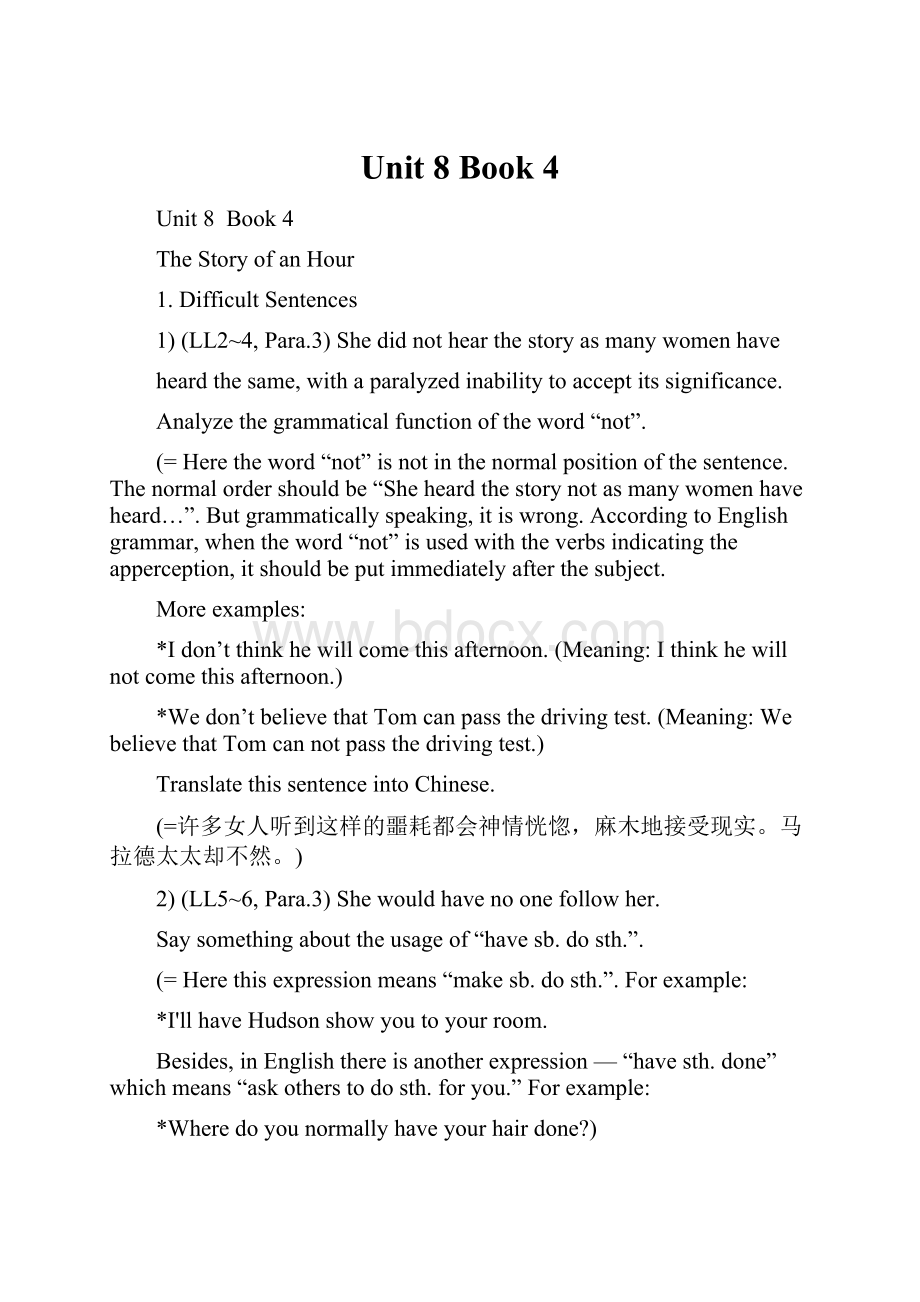Unit 8Book 4.docx
《Unit 8Book 4.docx》由会员分享,可在线阅读,更多相关《Unit 8Book 4.docx(19页珍藏版)》请在冰豆网上搜索。

Unit8Book4
Unit8Book4
TheStoryofanHour
1.DifficultSentences
1)(LL2~4,Para.3)Shedidnothearthestoryasmanywomenhave
heardthesame,withaparalyzedinabilitytoacceptitssignificance.
Analyzethegrammaticalfunctionoftheword“not”.
(=Heretheword“not”isnotinthenormalpositionofthesentence.Thenormalordershouldbe“Sheheardthestorynotasmanywomenhaveheard…”.Butgrammaticallyspeaking,itiswrong.AccordingtoEnglishgrammar,whentheword“not”isusedwiththeverbsindicatingtheapperception,itshouldbeputimmediatelyafterthesubject.
Moreexamples:
*Idon’tthinkhewillcomethisafternoon.(Meaning:
Ithinkhewillnotcomethisafternoon.)
*Wedon’tbelievethatTomcanpassthedrivingtest.(Meaning:
WebelievethatTomcannotpassthedrivingtest.)
TranslatethissentenceintoChinese.
(=许多女人听到这样的噩耗都会神情恍惚,麻木地接受现实。
马拉德太太却不然。
)
2)(LL5~6,Para.3)Shewouldhavenoonefollowher.
Saysomethingabouttheusageof“havesb.dosth.”.
(=Herethisexpressionmeans“makesb.dosth.”.Forexample:
*I'llhaveHudsonshowyoutoyourroom.
Besides,inEnglishthereisanotherexpression—“havesth.done”whichmeans“askotherstodosth.foryou.”Forexample:
*Wheredoyounormallyhaveyourhairdone?
)
3)(LL2~4,Para.4)Therestood,facingtheopenwindow,acomfortable,roomyarmchair.
Whatisthesubjectofthesentence?
(=Thesubjectis“acomfortableroomyarmchair”.)
Whatdo“openwindow”and“comfortableroomyarmchair”suggest?
(=Itsuggeststhatshewaslongingforahappylife.Therefore,wecaninferthatherordinarylifeisnotsatisfying.)
4)(Para.5)Shecouldseeintheopensquare…andcountlessbirdsweresinging.
SomereaderssaythisparagraphisuselessforithasnothingtodowithMrsMallard’sfeeling.Inyouropinion,whydidtheauthorwritethisparagraph?
(=Inmyopinion,thisparagraphiswellwritten.Theauthorusedsomewordsandphrasestodescribethepeacefullife.ThepurposeofherdescriptionistoshowMrsMallard’slifewasnothappy.Besides,bydescriptionofpeacefullife,theauthorpresentedasharpcontrastbetweenahappylifeandherrepressivelife.)
5)(LL1~2,Para.8)Shewasyoung,withafair,calmface,whoselinesbetrayedrepressionandevenacertainstrength.
Whatcanwelearnfromthesentence?
(=Thoughshewasyoung,herfacetoldreadersthatherlifewasnotgood.Orrather,shewaslivingadepressivelife.)
TranslatethispartintoChinese.
(=她很年轻,面容白皙而安详。
但她脸上的线条却显示着一种压抑,甚至是一种力量。
)
6)(LL1~2,Para.9)Therewassomethingcomingtoherandshewaswaitingforit,fearfully.
Whatdoes“something”inthissentencereferto?
(=Here“something”referstoakindoffeelingthatshevaguelyhad.Thatis,herhusband’sdeathreleasedherfromrepression.)
Whatcanweinferfromthewords“something”and“fearfully”?
(=Twopointscanbeinferredfromthesetwowords:
1.Bybirth,MrsMallardwasawomanwithtraditionalideology.
2.Atthattime,itwascommonsensethatawomanshouldberoyaltoherhusband.Nowherhusbanddiedandpeoplewouldregardherasguiltyiftheyknewshehad“something”inhermind.)
7)(LL3~4,Para.9)...creepingoutofthesky…
Whichisthelogicsubjectofthisphrasehere,“she”or“it”?
(=Itshouldbe“it”.)
TranslatethispartintoChinese.
(=……正在空中蔓延……)
8)(LL3~4,Para.10)…andshewasstrivingtobeatitbackwithherwill—aspowerlessashertwowhiteslenderhandswouldhavebeen.
Whatcanwelearnfromthispartofthesentence?
(=Wecanlearnthatshewastryingherbestnottohavethatkindoffeelingwithherwill,butshefailed.)
9)(LL3~4,Para.11)Thevacantstareandthelookofterrorthathadfolloweditwentfromhereyes.
TranslatethissentenceintoChinese.
(=伴随着那种感觉出现的茫然目光和恐惧神情从她的眼神里消失了。
)
10)(LL2~3,Para.12)Aclearandexaltedperceptionenabledhertodismissherhusband’sdeathastrivial.
Whatisthemeaningofthephrase“dismisssth.as”?
(=Itmeans“refusetoconsidersb.’sidea,opinion,etc.,withoutthinkingcarefullyaboutit”.Forexample:
*Hejustlaughedanddismissedmyproposalasunrealistic.他只是笑笑,以不实际为由拒绝了我的建议。
)
TranslatethissentenceintoChinese.
(=一种清楚又兴奋的感觉使她觉得丈夫之死是微不足道的。
)
11)(L3,Para.13)…fixedandgrayanddead.
Whatdoesthisphrasemodify?
(=Itmodifies“theface”.)
TranslatethissentenceintoChinese.
(=……毫无表情、灰白如纸、呆板的)
12)(LL4~5,Para.13)Butshesawbeyondthatbittermomentalongprocessionofyearstocomethatwouldbelongtoherabsolutely.
Whatistheobjectof“saw”?
(=Itreferstothefailuresandhardshipsinthepast.)
Whatdoesthesecond“that”inthesentencereferto?
(=Itrefersto“years”.)
13)(LL2~5,Para.14)Therewouldbenopowerfulwill….afellow-creature.
TranslatethissentenceintoChinese.
(=那时,她再也用不着盲目地屈从于任何专横的意志。
人们总是相信自己有权把个人的意志强加于自己的配偶。
)
Whatcanweinferfromthissentenceabouttherelationshipbetweenthecouple?
(=Maybethehusbandisalittlebitbossyinthefamilyandthewifehastoobey.Asaresult,therelationshipbetweenthemisnotharmonious.)
14)(LL2~3,Para.17)Louise,openthedoor!
ThisisthefirsttimefortheauthortouseMrsMallard’sownnameinthestory.Whatcanwelearnfromit?
(=Wecanlearnthatatthattimethehostess’ownnamecouldn’tbementionedinpublic.Nowafterherreflectionshefeltthecomingoffreedomandshewasnolongersubordinatetoherhusband.Therefore,shecanuseherownname.)
15)(L5,Para.21)...atRichards’quickmotiontoscreenhimfromtheviewofhiswife.
WhydidRichardsdoso?
(=BecauseheknewMrsMallardhadaseriousheartcondition,ifshesawherhusband,maybeshewouldhaveaheartattack.Andofcoursehedidn’twanttoseetheconsequence.
2.WordsandExpressions
1)(L1,Para.1)afflict:
vt.[(~with)oftenpass.]causetosufferinthebodyormind;trouble
*Elderlypeoplearefrequentlyafflictedbythistypeofpneumonia.
(插入声音文件afflict)
(=Itisanillnesswhichafflictswomenmorethanmen.)
我希望你不要总是抱怨而使我苦恼。
(=Iwishyouwouldn'tafflictmewithyourconstantcomplains.)
2)(L2,Para.2)veiled:
a.wearingaveil;partlyhiddenorindirectly
expressed
*Veiledinmists,thehillsputonstrangeandbewilderingscenes.
远处的山色被一片烟雨笼住.(插入图veiled)
(=Thefarawaymountainswereveiledinamistyrain.)
3)(L2,Para.2)conceal:
vt.[(~from)ratherfml]hide;keepfrombeingseenorknown
*Shetriedtoconcealthefactthatshewaspregnant.
*一开始,我们对他母亲隐瞒鲍勃死亡的消息。
(=Atfirst,weconcealedthenewsofBob’sdeathfromhismother.)
cf.conceal,hide&screen
这些动词均含“隐藏,隐蔽”之意。
conceal正式用词,多强调有目的、有意识、巧妙地进行隐藏或隐瞒。
hide普通用词,既可指有意地隐藏,又可指无意或偶然地藏匿。
screen指把处于被发现的人或物掩盖起来,使其不被发现。
(Directions:
)Fillintheblankswiththewordsabove.Changetheformwherenecessary.
1.Afloppy(松垂的)hat______herface.
(=screened)
2.She's_____mybook(away)somewhere.(=hidden)
3.Hetriedto______hisheavydrinkingfromhisfamily.(=conceal)
4)(L2,Para.3)significance:
n.importance
(插入图significance)
*Thediscoveryofthenewdrugisofgreatsignificancefor/topeoplesufferingfromheartproblems.
那时候,很少有人意识到这一发现的重要性。
(=Atthattime,fewpeoplerealizedthesignificanceofthediscovery.)
Collocations:
appreciatethesignificanceof意识到……的重要性
attachmuchsignificanceto重视
holdnosignificanceforsb.对某人来说毫无意义
takeonanewsignificance获得新意义
5)(L3,Para.4)haunt:
vt.[notinprogressiveforms,usu.pass.](esp.ofsth.strangeorsad)bealwaysinthethoughtsofsb.)
*Ifyoudon’thelpme,I’llhauntyouaftermydeath.
她总是想起4年大学生活。
(=Memoriesofherlifeincollegeforfouryearshaunther.)
6)(L1,Para.6)patch:
n.asmallareawhichisdifferentinsomewayfromtheareathatsurroundsit
*Therewerelotsoficypatchesontheroadthismorning.
最后,我们终于找到一块能坐下的草地。
(插入图patch)
(=Wefinallyfoundapatchofgrasstositdownon.)
7)(L1,Para.8)betray:
vt.beasignof(sth.onewouldliketohide);showtherealfeelingsorintentionsof
Hehadagooddisguise,butassoonashespokehebetrayedhimself.
(插入声音文件reflection)
(=Askingquestionswouldbetraymyignorance.)
cf.betray,deceive,mislead&trick
这些动词均含“欺骗”之意。
betray一般指向敌人或当局出卖或泄露某事。
deceive强调以虚伪的东西欺骗别人,使其信以为真去做某事。
mislead指自己对他人或他事产生错误想法或印象,将某人引入歧途。
trick指用欺诈手段来哄骗,但一般并无恶意。
(Directions:
)Fillintheblankswiththewordsabove.Changetheformwherenecessary.
1.Heclaimedhewas____intocarryingdrugs.(=tricked)
2.Judas______Jesustotheauthorities.(=betrayed)
3.Politicianshave____thepublicoverthedangersofthesechemicals.
(=misled)
4.Whatkindofmanwould____hisownsistertothepolice?
(=betray)
5.Wewere______intobelievingthathecouldhelpus.(=deceived)
8)(L2,Para.8)repression:
n.
1.verystrongcontroloffeelingsordesires
*Thecitieswerebeautifulandadornedwithallthefinethingsoftheglobe.
抑制使他表现得更糟。
(=Repressionmadehimbehaveworse.)
2.cruelandseverecontrolofalargegroupofpeople
*Thepoliticalrepressioninthiscountryisenforcedbyterror.
9)(L4,Para.8)reflection:
n.[C;U(on)]
*Theirjourneythusfarhadprovidedhimwithmuchfoodforreflection.
读者往往被书籍带进一个思想和反省的境界里去。
(插入图reflection)
(=Thereaderisalwayscarriedawayintoaworldofthoughtandreflection.)
(插入声音文件reflection)
(=Withoutselfreflection,amanwillbecomedull.)
Collocations:
givereflectionto考虑
*Hegavemuchreflectiontotheproblembutstillhadnoanswer.
他对那个问题思考很久,但仍未找到答案。
be/castareflectionon/upon(言论、行为等)使人对……产生怀疑(或鄙视)
*Yoursillyletterisareflectiononyourcommonsense.
你这封愚蠢的来信使人感到你太没有常识了。
castreflectionon说……坏话,指责
*Youshouldn’thavecastreflectionsonmywife.
你不该说我妻子的坏话。
10)(L5,Para.8)suspensionn.[U]theactofstoppingorcausingtobeinactiveo